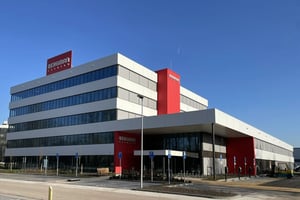Opposition is growing to the intensive farming of cattle due to the impact these methods have on the environment and the climate. At the same time, this kind of farming forms an indispensable link in a sustainable agriculture chain that has the potential to feed the future population of the world – all the more reason to make cattle farming more sustainable. With their programme, ‘Better Breeding Today for a Brighter Life Tomorrow’, Hendrix Genetics is keen to make a real contribution to that effort, a contribution that is grounded in the Social Development Goals.
Calls for more plant-based diets are growing louder, at least in Western Europe and other prosperous parts of the world. Meat and dairy should play only a limited role in those diets, with more emphasis being placed on vegetables, fruit and legumes. If this vision becomes a reality, arable farming will need to become a dominant force in agricultural systems, while the role of cattle farming will become more marginal.
However, experts like Jaap van Wenum, Chair of LTO Akkerbouw, have pointed out that the decimation in cattle numbers that some commentators support would not be in the interest of a strong arable farming sector – after all, a world without cattle is a world without animal manure to fertilise the crops. The minerals and the organic matter extracted from the soil during arable farming practices need to be replenished, and cattle farms are well positioned to do just that, as well as to recycle arable products so as to provide valuable nutrients for plants and for the soil. In addition to grass (which humans are unable to digest), other by-products and residual products of arable farming include beet pulp, potato pulp and brewers’ grains.
In short, in order to achieve truly sustainable agriculture and horticulture, it is essential to strike the right balance between plant and animal production. Cattle must be farmed as sustainably as possible, although that is easier said than done in view of the many and varied factors involved in livestock farming. One of those factors – in fact, one of the most important – is the selection of the animals with the best genetic makeup, according to Marcel Huijsmans from Hendrix Genetics. “Selecting the right animals increases the productivity and the efficiency of animal protein production,” he explains. “That way, you need fewer resources and you minimise each individual animal’s impact on the environment.”
A focus on high-quality genetics
For decades, Hendrix Genetics – an NPM Capital portfolio company - has excelled in boosting yields and increasing productivity through improved genetics. “For example,” says Huijsmans, “we have become so good at breeding laying hens that our chickens now lay 43% more eggs than chickens in the 1960s produced. Put another way: emphasising high-quality genetics has given the world 43% more eggs with the same number of hens and a smaller impact on the environment.”
Another aspect of sustainable breeding is that it focuses on animals that can convert relatively small amounts of feed, or comparatively low-quality feed, into high-quality meat. As Huijsmans notes, “Pigs are a good example of this. They are masters at the hyper-efficient conversion of lower-quality feed, such as human food waste, into high-quality protein. When you reinforce that quality in the animals, you are indirectly reducing your CO2 footprint.”
A third element of sustainable breeding involves selecting animals that are well equipped to overcome the challenges of specific accommodation and climate conditions. The keyword is resilience. “Animals that have the right resilience against certain diseases and climatological conditions have a better chance of survival,” says Huijsmans, “which means they help reduce food waste further along the chain.”
Agenda for Sustainable Development
With this strategy, Hendrix Genetics has made significant, concrete progress in terms of four Social Development Goals (SDGs), the international targets the United Nations formulated in 2015 to tackle the world’s most urgent challenges with regard to sustainability. This ‘Agenda for Sustainable Development 2030’ includes targets for aspects such as tackling poverty, promoting public health, improving education, reducing inequality, managing the environment and combating climate change.
“Our programme, ‘Better Breeding Today for a Brighter Life Tomorrow’, is part of our active contribution to SDG 2 [ending all forms of hunger and malnutrition – Ed.], SDG 12 [responsible consumption and production – Ed.], SDG 13 [taking action to support vulnerable regions whilst simultaneously reducing emissions – Ed.] and SDG 17 [forming partnerships to work towards achieving all the SDGs – Ed.],” Huijsmans explains. “At Hendrix Genetics, we have wholeheartedly embraced these SDGs and developed clear ideas about how we can promote them within our own company. They will form the foundation of how we carry out our day-to-day tasks over the next five years.”
One example that illustrates SDG 2 is Hendrix Genetics’ focus on those regions that are expected to see the most population growth in the coming years, such as Asia and Africa. According to Huijsmans, “One of our biggest priorities now is to increase the efficiency of protein production in these regions. We believe that, with our high-quality animal genetics, we can make a huge contribution to relieving hunger, especially in the areas that currently have only very limited and potentially depleted genetic resources, such as Sub-Saharan Africa.”
SDG17: cooperation with partners
Hendrix Genetics works closely with a diverse range of businesses, universities, governments, research institutes, non-profit organisations (such as the Bill and Melinda Gates Foundation) and other authorities in its efforts to take on the global food challenge. One body that deserves special mention is Breed4Food, a consortium that was founded by five organisations: Wageningen University and four international cattle farming companies. Breed4Food has ambitions to become an international centre of excellence for research and innovation in the field of animal genetics.
Also read ‘The African poultry project: one year later’
Also read ‘Blockchain – transparency in the supply chain’



.jpg?width=448&height=200&name=cybersecurity-privacy-protect-data%20(1).jpg)









